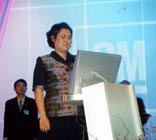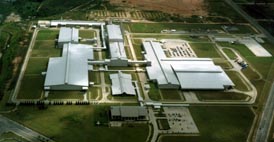|
General Mortors Thailand opens Royong plant with a Royal occasion
BOI Hosts Seminar: A Guide to Thai Investment Policy Thailand’s Board of Investment (BOI) hosted a seminar, “A Guide to Thai Investment Policy,” Tuesday July 25 at the Bangkok Convention Center. The daylong seminar included an exhibition and investors’ clinic throughout the day and an afternoon panel discussion with an extensive question and answer period in the afternoon. The evening featured a dinner with a keynote address from Prime Minister Chuan Leekpai. The seminar was called to explain the revised BOI investment promotion policies that were approved by the BOI Board in May and which took effect on August 1, 2000. More than 2,000 people attended the investors clinic, the afternoon session and the dinner talk. The afternoon session covered the topic “The New Investment Policy”. H.E. Abhisit Vejjajiva, the Minister attached to the Prime Minster’s Office and in charge of the BOI, opened the afternoon session. In his address, Mr. Abhisit reiterated the Thai government’s commitment to maintaining a liberal economy based on free market principles and its desire to work closely with the private sector. He noted that this philosophy accounted for Thailand’s economic growth prior to the financial crisis of 1997 and the government had relied on these principles to stabilize the crisis and facilitate recovery. Mr. Abhisit said leading economic indicators have shown the economy is recovering and returning to normal. He pointed out imports of capital goods have seen a healthy increase and that applications for BOI promotional privileges have increased 76 percent for the first five months of this year compared to the same period a year ago. By the end of the year, the BOI expects to receive applications for projects worth some 300 billion baht. The challenge now, Mr. Abhisit said, is to adapt BOI policies to the changing global trade environment and the needs of Thailand. He noted that the government’s fiscal situation has been seriously affected by the financial crisis. He said that it is essential that BOI policies are consistent with the fiscal and economic demands of the nation, but also are able to attract new foreign investors. Any changes to policy must balance these two sets of needs, he said. To accomplish this feat, the BOI executives and staff held numerous meetings in extensive consultation with the private sector, trade and industry groups, academics, and government agencies before drafting the new policies, Mr. Abhisit said. The emphasis, he said, was on maintaining continuity with the old policies while making some adjustments for the changing times. One aim of the new policies is an attempt to ensure that losses in revenue incurred from granting tax and duty exemptions leads to useful investments for the nation’s overall economy and social benefits for the people of Thailand. In this respect, the minister said, the new policies retained the heart of the 1993 Investment Act, which had the goal of spreading economic prosperity to all corners of the Kingdom. Other highlights of the new policy include: -Changes in BOI Promoted Zones. Rayong and Phuket provinces have been moved from Zone 3 to Zone 2. Projects locating in the 18 least developed provinces in Zone 3 will receive maximum promotional privileges. -Industrial Estates. The new policy grants greater incentives to firms locating in industrial estates than to firms locating outside industrial estates, and projects locating in existing industrial estates can enjoy incentives under the previous scheme, if applications are submitted before the end of 2004. -Global Competitiveness. The BOI now requires projects worth 10 million baht and more to obtain quality certification, such as ISO 9000 certification or a similar internationally recognized standard. -Priority activities. The BOI will grant import duty and income tax exemptions for eight years, regardless of zone, for projects priorities activities: agriculture, technology and human resource development, transportation, infrastructure and services, and environmental protection and preservation, as well as targeted industries. -Foreign Shareholding. In line with the new Foreign Business Act, the BOI has relaxed restrictions on foreign shareholding in most promoted projects. Full details of the new policies can be found on the “What’s New” page of the BOI’s website at http//www.boi.go.th
Eurocity to close Royal Garden office Managing Director Barry Young confirmed that Eurocity International-Pattaya is to close its office in the Royal Garden Resort in October 2000. Young said, “The Royal Garden has been wonderful in providing great service. However, whilst the location proved to be an ambitious one, the concept of the Buyer’s Agent was perhaps ahead of its time. Despite the many inquiries that were received via telephone, fax, email and people dropping by, not enough had been converted into clients.” Eurocity International entered into a very competitive real estate market here in Pattaya, and like many new business it takes time to get established and recognized. Advertising in the local press, on the Pattaya Mail Channel and sponsorship of various events have at least put the Eurocity name in front of Pattaya and the tourist population. Barry said, “It is now a case of simple economics. The business will continue to be administered through lawyers & accountants in Bangkok where the registered office is also situated.” Eurocity International-Pattaya is looking at other locations, both in Jomtien and Pattaya, and may well end up utilizing one floor above the International Bar in Soi Eight.
Copyright 2000 Pattaya Mail Publishing Co.Ltd. |
|
 HRH
Princess Maha Chakri Sirindhorn presided over the official opening of the
General Motors assembly plant at the Eastern Seaboard Industrial Estate.
HRH
Princess Maha Chakri Sirindhorn presided over the official opening of the
General Motors assembly plant at the Eastern Seaboard Industrial Estate. General
Motors Thailand Assembly Center
General
Motors Thailand Assembly Center